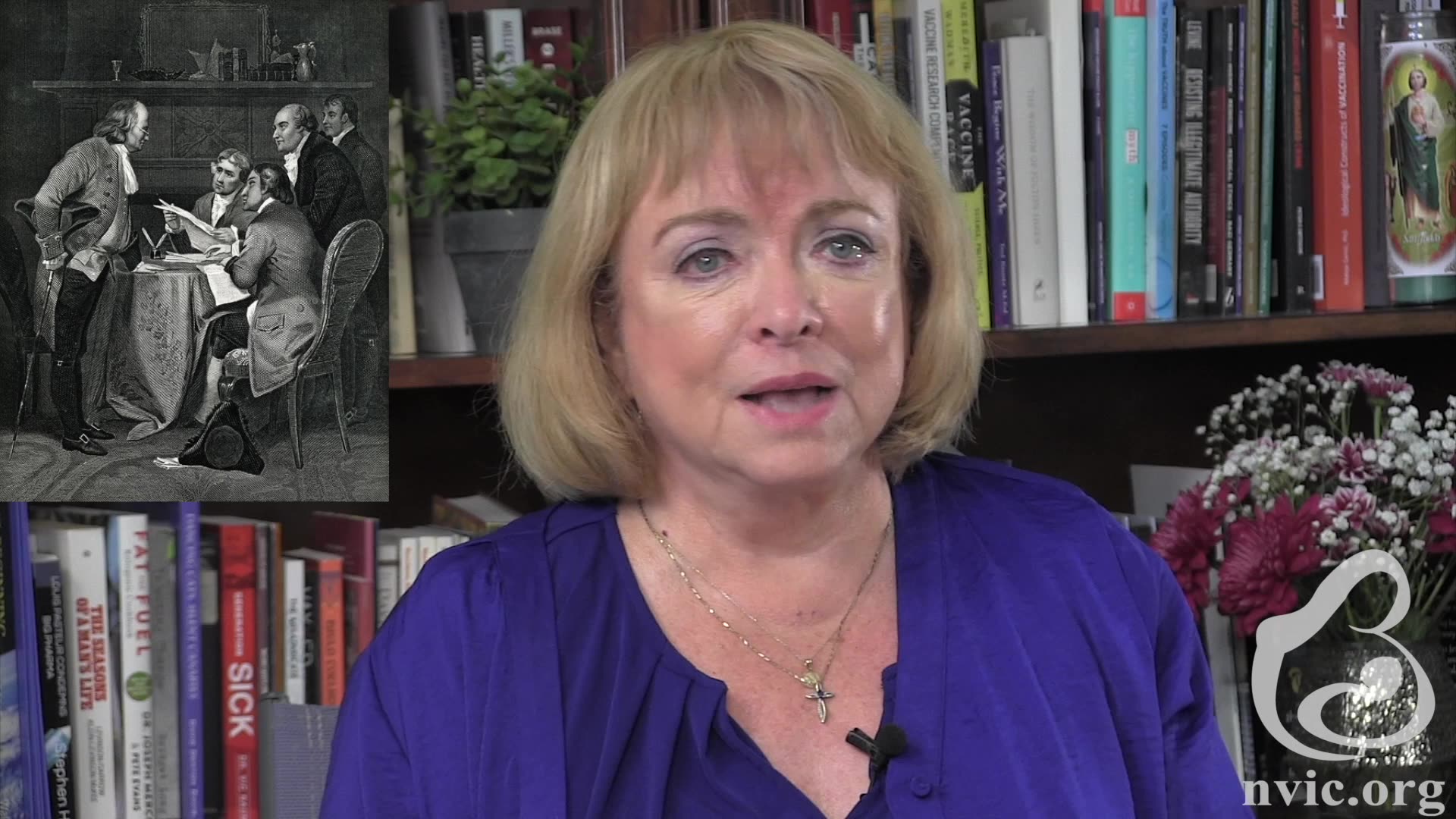In a show of protest against budget and staffing cuts at the U.S. Centers for Disease Control and Prevention (CDC), former employees of the agency, scientists, and community activists organized a “die-in” demonstration outside the CDC’s Roybal Road campus in Atlanta, Georgia. On May 2, 2025, the Trump administration proposed a budget to Congress for the next fiscal year (FY) that includes reducing funds for the CDC by 39 percent, from $9.2 billion in FY2025 to $5.6 billion in FY2026. Layoffs have been estimated at about 2,400 employees, or roughly 18 percent of the CDC’s staff—although some 460 of those laid-off workers are now being rehired.1 2 3 4
The protest consisted primarily of individuals laying on the ground next to protest signs in the shape of gravestones symbolizing people who may die as a result of the CDC downsizing. The signs read, “In loving memory of our children’s health” and “I should have got the vaccine” and “Died from vaccine preventable respiratory illness” and “Death by HIV” and “Death by bird flu” and “I died of Ebola” and “RIP public health.”5 One of the protesters interviewed explained…
The work that we do is really important. It helps save lives, prevent disease and death. So doing something like this in front of the CDC now is just a really powerful visual and really helps illustrate the things that can happen when you don’t have a CDC that is well funded and is highly staffed and is functioning well. It could be a reality in a few months when cold and flu season hits us and if we don’t have the ability to communicate and do our work how many people are going to die of flu, of RSV, of COVID-19 this fall when the respiratory diseases hit.5
The “die-in” reflects the sentiment voiced by opponents of U.S. Secretary of Health and Human Services Robert F. Kennedy, Jr. to transform the focus of the Department of Health and Human Services (DHHS) and the key health-related agencies it overseas, including the CDC, the Food and Drug Administration (FDA), and the National Institutes of Health (NIH). The underlying message seems to be that, although the health of most Americans is very poor, there is no need for any thorough reviews or outright overhaul of the system responsible for this calamitous situation and no call for taking a serious look at the science behind many of the drugs on the market that may be doing more harm than good…
… No call to consider the possibility that some of those drugs, including vaccines, could actually be contributing to some of the chronic diseases and illnesses increasingly plaguing so many people. No call for questioning the massive conflicts of interests with the pharmaceutical industry that compromise the integrity of our health regulatory agencies. No call for entertaining the possibility that, by dramatically changing the focus and structure of the DHHS and its agencies, they might be able to accomplish more with less resources.
The message is, while the U.S. health regulatory and research system isn’t perfect, it’s basically working just fine and any attempts to drastically change it, risks killing lots of people. This has certainly been the case when it comes to Secretary Kennedy’s focus on reviewing the safety of vaccines and ensuring that the process has not been scientifically compromised.
The Shrill Attacks Against Kennedy
Kennedy’s willingness to question the assumption that all vaccines have been proven to be “safe and effective” and that, thus, there is no reason to doubt the slogan, is viewed by many as a grievous sin because of its potential to spread “vaccine hesitancy” among Americans which could ultimately dissuade them from getting certain (or all) recommended vaccines themselves and for their children. Such a scenario is often framed by Kennedy’s critics as representing some sort of mortal danger to the public.
Last month, longtime political strategist James Carville characterized vaccines as “the greatest public health intervention in the history of the world” and criticized Kennedy for having “expressed vaccine skepticism at every point.” Carville said:
Every notable public health person thinks that vaccines are the greatest public health innovation in the history of the world. What he’s doing is going to kill people. … Bobby Kennedy is going to kill more people than any Cabinet secretary, maybe in history, with his idiotic vaccine policy.6
“[K]ill more people than any Cabinet secretary in history”? That’s a pretty bold statement, and you have to wonder whether Carville, who is known for his hyperbole, was merely mouthing off. But it’s not like Carville is the oddball in making such statements.
Even before Kennedy was confirmed to head the DHSS, there were numerous U.S. Senators, medical professionals, and public health activists who joined together to oppose Kennedy for fear that his confirmation would result in the deaths of many people. In January, Sen. Chris Murphy of Connecticut stood on the steps of the Capitol and rejected Kennedy’s confirmation, stating:
Chances are that you’ll still get someone pretty bad, but you won’t get somebody who’s going to kill as many people as RFK, Jr. will.7
There does seem to be a fair number of influential people who see Kennedy’s efforts to radically change the public health status quo as a serious threat—be it to the health of Americans, the significant financial interests of the pharmaceutical industry, the already tenuous reputations of the medical and pubic health establishments, or some combination of the three.
If Kennedy is successful in implementing his Make American Health Again (MAHA) agenda, there will be some industries, institutions, and prominent individuals who stand to lose credibility, money, and influence. There may be a gradual paradigm shift in what the public has always assumed to be the truth regarding certain areas of public health. Such a shift may pose a threat to some. Perhaps enough to incite them to join the doomsday chorus attacking Kennedy and his policies.
Kennedy’s decision to replace all 17 members of the CDC’s Advisory Committee on Immunization Practices (ACIP) on June 9, 2025 due to concerns about their conflicts of interest with the pharmaceutical industry has certainly led others to join the chorus attacking the DHHS Secretary. “This is one of the darkest days in modern public health history,” said Michael Osterholm, PhD, MPH, director of the University of Minnesota’s Center for Infectious Disease Research and Policy (CIDRAP). “Science does not matter to Mr. Kennedy.”8
Kennedy Didn’t Create the Health Crisis in the U.S.
In the midst of all the negativity spewed at Kennedy, it is important to remember that there have been calls to reform the U.S. public health and health care systems for years because it has been recognized for sometime now that the systems have not served the American people well. Some 60 percent of adults in the U.S. suffer from at least one chronic illness and 40 percent suffer from multiple diseases. One in three children in the U.S. suffer from at least one chronic illness that could “significantly affect their health for the rest of their lives.”9 10
For years, there have been calls to fix or reform government health agencies such as the CDC and FDA, suggesting they were not performing their jobs well enough. There have long been concerns about their growing conflicts of interests with the industries they regulate or with which they work closely, and that they lacked the independence needed to make decisions primarily in the public’s interest. This is not a Kennedy invention.11 12 13 14
There appears to be a consensus of opinion in the U.S. that change is required to deal with the American health crisis because too many people are suffering and dying unnecessarily. But that consensus starts to fall apart when someone like Kennedy comes along who wants to take apart and reshape the system and thought processes that have created a public health crisis in the first place.
If you would like to receive an e-mail notice of the most recent articles published in The Vaccine Reaction each week, click here.
Click here to view References:1 FOX 5 Atlanta Digital Team. Former CDC employees staging ‘die-in’ Thursday afternoon. FOX 5 Atlanta June 18, 2025.
2 Science News Staff. Trump’s proposed budget would mean ‘disastrous’ cuts to science. Science May 2, 2025.
3 Branswell H, Owermohle S. At CDC, Trump administration’s job cuts wipe out wide array of specialists. STAT Apr. 1, 2025.
4 Weixel N. CDC backtracks, will rehire more than 450 people it laid off. The Hill June 12, 2025.
5 11Alive. “Die-in” outside the CDC.” YouTube June 20, 2025.
6 Fortinsky S. Carville: RFK Jr. ‘is going to kill more people than any Cabinet secretary, maybe in history’ The Hill June 19, 2025.
7 Martinez X. Democratic Senators Say RFK Jr. Would ‘Kill’ People as HHS Chief. The Wall Street Journal Jan. 30, 2025.
8 Schnirring L. Kennedy removes all ACIP members, eyes replacements. CIDRAP June 9, 2025.
9 Dahima P. Primer: Chronic Disease Among Adults in the United States. American Action Forum July 1, 2025.
10 Thompson D. 1 in 3 Children Now Suffer From Chronic Illness. U.S. News & World Report Mar. 17, 2025.
11 Interlandi J. Covid Proved the C.D.C. Is Broken. Can It Be Fixed? The New York Times Magazine Oct. 18, 2021.
12 Schram C. The CDC is broken and apologies can’t fix it. The Hill Aug. 23, 2022.
13 Cosgrove L. A Legacy Of Corruption In The FDA And Big Pharma. Eurasia Review Sept. 21, 2021.
14 Taylor M. It’s Time to Fix FDA by Breaking It Up. Politico Apr. 11, 2022.











